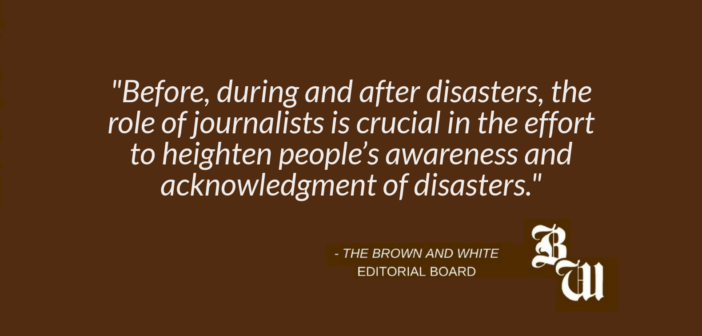Ferocious winds, thunderous floods and crippling damage are only part of the terror that storms like Hurricane Florence and Typhoon Mangkhut brought when they made landfall a few days ago.
While Florence has dominated the national news cycle and received plenty of government awareness, you may not have even heard of Mangkhut, which has been more damaging, wreaking havoc on the Philippines and Southern China.
Despite the proximity of Florence versus Mangkhut, they should both receive the same devotion of aid and attention from our country. The location of a storm shouldn’t determine the amount of attention and awareness it receives from our government and our citizens.
Such a mindset was lost when our government disputed the death toll of Hurricane Maria. After researchers at the George Washington University found months later that almost 3,000 Puerto Ricans died as a result of the hurricane, President Trump disputed these claims in a tweet.
After Hurricane Katrina, it took a little over two weeks for Congress to begin investigating the way the Bush Administration responded to the storm. After 22 hearings and a 500-plus-page investigation, there were recommendations for reform.
In the year since Maria, the Senate and House have only held two hearings and have yet to issue any major reports about the way the Trump Administration has responded to the storm.
With an ‘America First’ mindset applied to not only foreign countries but also to U.S. territories, we must not forget that the U.S. has taken on an interventionist role in global politics and we have to be consistent where we place our empathy.
We have to consider the living conditions of those affected and recognize that disaster recovery and aid might not be as accessible elsewhere as it is in the U.S. And some people might have greater access than others.
For example, those living in the path of a storm might not have the means to evacuate to a safer location. It can be difficult to uproot and disperse entire families, especially if there are small children. Perhaps a family does not have the money for flights or hotel accommodations.
For these reasons, it’s important to treat damage with respect. It’s necessary to understand that the ways to prepare and deal with a disaster vary based on the part of the country and even the world.
More recent natural disasters such as Hurricane Harvey and Irma generated empathy and attention, as they were domestic and many people have relatives in Texas and Florida.
There is a significant international population both at Lehigh and in the U.S. which is why it’s important to devote attention to international disasters. All natural disasters should be treated with the same care by our government and press, regardless of their location.
Last year alone, mudslides in Colombia and Sierra Leone, earthquakes in Mexico and monsoon flooding in Bangladesh claimed hundreds of lives and caused immense damage.
Lehigh students and U.S. citizens might have friends or relatives living in these countries, and could wonder why there hasn’t been enough aid or enough of a response by our government to the disasters.
As an editorial staff, we feel compelled to bring this issue to light because when nationalistic sentiment leads to an imbalance in disaster awareness, the press is the only platform to keep people informed.
Before, during and after disasters, the role of journalists is crucial in the effort to heighten people’s awareness and acknowledgment of disasters. Statistics, death tolls and damage reports about these disasters should be placed in the public eye.
Putting ourselves in the shoes of those affected by disasters is the best way to assist each other in our humanitarian efforts. It’s important to be consistent with our empathy, as we never know who among us is grieving or suffering because of a disaster back home.






Comment policy
Comments posted to The Brown and White website are reviewed by a moderator before being approved. Incendiary speech or harassing language, including comments targeted at individuals, may be deemed unacceptable and not published. Spam and other soliciting will also be declined.
The Brown and White also reserves the right to not publish entirely anonymous comments.
1 Comment
“An ounce of prevention is worth a pound of cure”. I would think that universities would be working on effective responses to natural disasters, especially hurricanes which usually give fair warning. Houses can be constructed to lessen the possibility of damage, power lines can be buried, trees can be cut etc. Pennsylvania has a history of flooding disasters and also a history of flood control projects, which are not always a complete fix. My grandparents house was flooded both before and after a protective dike was constructed. Rainfall events seem to be more intense and numerous.
On the global warming front, universities should be considering actions to be taken to prevent damage, injury and death as sea levels rise. Even if our tweeting leader and congress turn green, sea levels will probably continue to rise. It may be necessary to consult with the Netherlands to prevent large portions of Florida and Delaware from being captured by the sea.
The earth has been subject to massive changes without the aid of humans and will undoubtedly continue to do so, Ecological insanity may bring change faster, but our response will probably be more important than any corrective actions taken to forestall change.
Respond with compassion but attempt to prevent the damage in the first place.